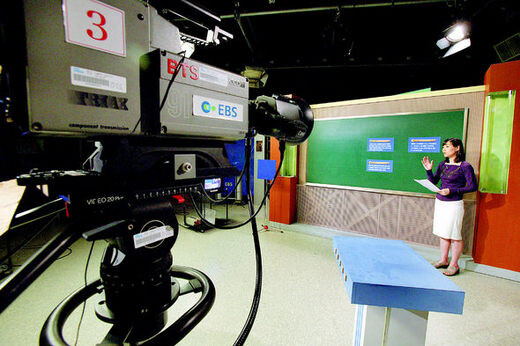hankyoreh
Links to other country sites 다른 나라 사이트 링크
With online education market hot, prices skyrocket

With the opening of the "Internet age," South Korea’s furious private education market - encompassing afterschool academies and cram schools - has found a new place to expand. However, recent price hikes for such online education are fueling concerns that there is no escape from the financial burden exacted on parents by Korea’s education-crazed culture.
Online lecturing, first introduced in the late 1990s, is now considered one of the major kinds of private education for Korea’s primary and secondary students, because tuition fees for nationally-renowned "star lecturers" were for a long time cheaper than offline private institutes. However, those days are swiftly coming to a close.
In 2004, the government tried to jump in and provide free Internet service through the public Educational Broadcasting System (EBS). However, the result was to further fuel the online education market, as the government’s entry into the field seemed to signal the efficacy of online education. Now, large private firms such as SK and KT have even joined the market, making the competition even fiercer. In addition, the business models found within Internet education have become more diverse; for example, a service launched in December of last year provided lectures for free, but made profits through advertising and textbook sales.
As a result, those Internet-based educational program suppliers, which had initially aimed their product at saving private educational costs for parents and narrowing the education gap between rich and poor, have increased online tuition fees to the level of their offline counterparts. Meanwhile, the fact that the Internet education giant Megastudy occupies a market share of higher than 70 percent in the for-pay Internet education market is raising concerns about monopolistic abuses in the business.
Meanwhile, as Internet classes gained in popularity, small private institutions in the outskirts of Seoul and other less urban areas, which can not compete with the online classes, have seen a slump in bussiness. As a result, private college preparatory institutions have changed their focus to what Internet lecturing cannot easily provide, such as intensive writing improvement courses as well as courses individually tailored for a given student.
Please direct questions or comments to [englishhani@hani.co.kr]
Editorial・opinion
![[Column] Season 2 of special prosecutor probe may be coming to Korea soon [Column] Season 2 of special prosecutor probe may be coming to Korea soon](https://flexible.img.hani.co.kr/flexible/normal/500/300/imgdb/original/2024/0426/3317141030699447.jpg) [Column] Season 2 of special prosecutor probe may be coming to Korea soon
[Column] Season 2 of special prosecutor probe may be coming to Korea soon![[Column] Park Geun-hye déjà vu in Yoon Suk-yeol [Column] Park Geun-hye déjà vu in Yoon Suk-yeol](https://flexible.img.hani.co.kr/flexible/normal/500/300/imgdb/original/2024/0424/651713945113788.jpg) [Column] Park Geun-hye déjà vu in Yoon Suk-yeol
[Column] Park Geun-hye déjà vu in Yoon Suk-yeol- [Editorial] New weight of N. Korea’s nuclear threats makes dialogue all the more urgent
- [Guest essay] The real reason Korea’s new right wants to dub Rhee a founding father
- [Column] ‘Choson’: Is it time we start referring to N. Korea in its own terms?
- [Editorial] Japan’s rewriting of history with Korea has gone too far
- [Column] The president’s questionable capacity for dialogue
- [Column] Are chaebol firms just pizza pies for families to divvy up as they please?
- [Column] Has Korea, too, crossed the Rubicon on China?
- [Correspondent’s column] In Japan’s alliance with US, echoes of its past alliances with UK
Most viewed articles
- 1‘We must say no’: Seoul defense chief on Korean, USFK involvement in hypothetical Taiwan crisis
- 2[Column] Season 2 of special prosecutor probe may be coming to Korea soon
- 3N. Korean delegation’s trip to Iran shows how Pyongyang is leveraging ties with Moscow
- 4Korea sees more deaths than births for 52nd consecutive month in February
- 5Amnesty notes ‘erosion’ of freedom of expression in Korea in annual human rights report
- 6[Reportage] On US campuses, student risk arrest as they call for divestment from Israel
- 7[Editorial] New weight of N. Korea’s nuclear threats makes dialogue all the more urgent
- 8‘Weddingflation’ breaks the bank for Korean couples-to-be
- 9[Column] Has Korea, too, crossed the Rubicon on China?
- 10[Column] Park Geun-hye déjà vu in Yoon Suk-yeol